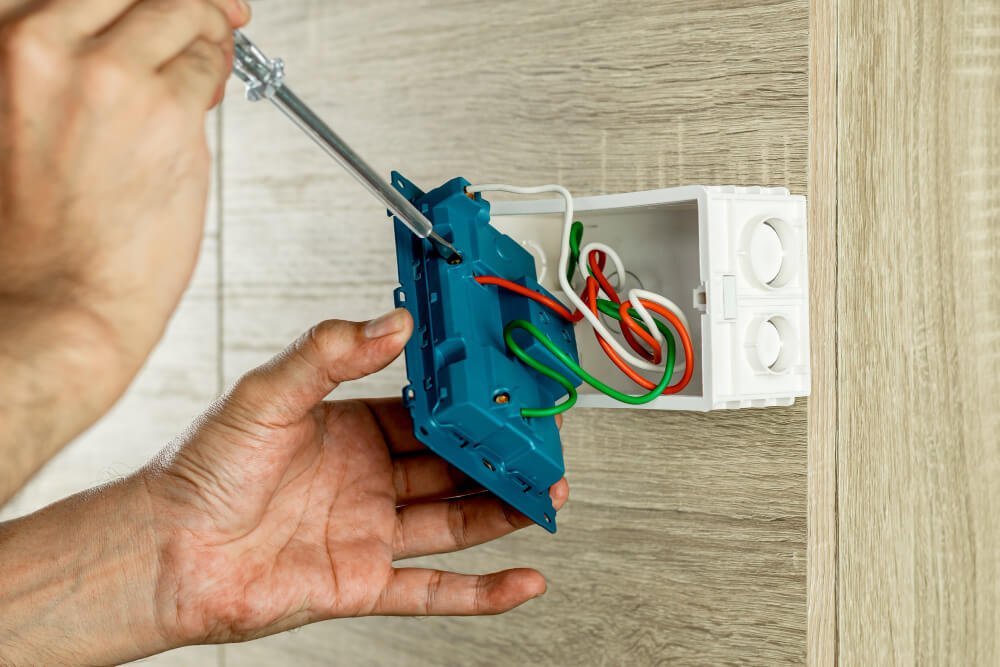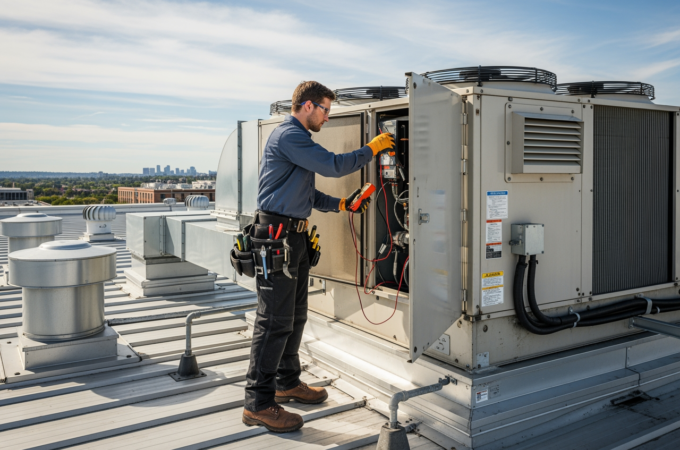
Electrical Safety Tips for Homeowners
Table of Contents
ToggleKey Takeaways
- Regularly inspect your home’s electrical systems for wear or damage to catch small issues before they become big problems.
- Distribute electrical loads to prevent circuit overloads and keep your systems within their intended safety limits.
- Use extension cords only when necessary and never as permanent wiring, as they can wear out or become trip hazards.
- Install GFCI outlets in moisture-prone areas, and test them regularly to ensure continuous protection.
- Keep all electrical devices and cords away from water sources, especially in kitchens and bathrooms, which are at the highest risk of shock.
- Educate every household member—including children—about electrical safety basics and the dangers of carelessness.
- Always rely on licensed electricians for repairs, upgrades, and installations that require knowledge and code compliance.
- Maintain functional smoke and carbon monoxide detectors throughout the home for protection from unseen dangers.
Electrical safety is a vital aspect of home maintenance that every homeowner should take seriously. From overloaded outlets to faulty wiring, electrical hazards can lead to fires, injuries, or costly damage if not properly managed. Understanding basic safety practices helps prevent accidents and ensures your home’s electrical system operates efficiently and reliably. Whether tackling a DIY project or simply plugging in everyday appliances, knowing how to identify and avoid common risks is essential. This guide offers practical electrical safety tips to help homeowners protect their families, property, and peace of mind.
Electrical safety is a crucial aspect of maintaining a secure and comfortable home. While electricity powers nearly every aspect of daily life, improper handling or minor oversights can lead to serious dangers such as electrical fires, shocks, etc. Integrating comprehensive electrical safety precautions is essential whether you’re a new or seasoned homeowner. Consulting professionals like Sartell Electrical Reading MA ensures your home’s electrical systems remain up to code and safe for your family. The complexity of modern electrical systems means that issues may not always be obvious, and addressing concerns quickly will minimize risks to your property and household.
Many electrical hazards are preventable with awareness and responsible practices. By adhering to tested safety measures, you lower the risk of incidents and protect both your property and loved ones. Don’t underestimate the importance of periodic inspections and quality electrical work from certified experts—a little prevention can save lives and costly repairs. Taking your time to build good habits and diligence in system upkeep will form the foundation of household electrical safety for years to come.
Regular Inspections
Proactive safety starts with routine checks of your home’s electrical infrastructure. Look for evidence of frayed wires, discolored or scorched outlets, buzzing or flickering lights, and frequently tripped circuit breakers. Early detection of these warning signs is key to reducing your home’s fire risk and minimizing the chance of power failures. Electrical issues often arise within walls or attics—places homeowners rarely see—making regular inspections even more critical. If anything appears abnormal, refrain from making repairs yourself and immediately seek help from a trained electrician equipped to spot and fix issues safely. This professional evaluation can identify aging wiring or overloaded circuits before they escalate into emergencies. In addition to inspections, avoid overloading outlets with multiple high-wattage devices, which can strain your electrical system. Use surge protectors to safeguard electronics from power spikes, especially during storms or outages. Keep electrical cords untangled and away from heat sources or moisture-prone areas to prevent deterioration. Teach children about the dangers of outlets and cords to foster awareness and avoid accidents. Taking these extra precautions creates a safer living environment and extends the lifespan of your home’s electrical system.
Avoid Overloading Circuits
Many fires start when too many appliances or devices draw power from a single circuit or outlet. Large appliances like refrigerators or space heaters should always have their outlets and must never be combined with high-wattage devices on the same circuit. Power strips and adapters may seem convenient, but excessive use creates a significant risk. Instead of relying on these temporary fixes, evaluate how your family uses electricity in each room and consider adding new outlets if necessary. If you need more outlets for your daily needs, contact a professional to install additional circuits rather than overloading extension cords or using multiple multi-outlet adapters in one socket.
Proper Use of Extension Cords
Extension cords provide temporary power solutions but are not intended to replace permanent wiring. Never route extension cords under rugs, carpets, or heavy furniture since this can cause overheating and potentially spark a fire. Always examine cords for damage; even slight fraying or cracks in the outer insulation can expose wires, increasing the risk of short circuits or shocks. Check the wattage limit for each cord to ensure it matches the requirements of plugged-in devices. Cords in poor condition, with cracked insulation or exposed wires, should be discarded and replaced immediately. If you routinely need to use extension cords to power devices, it’s time to install more permanent outlets in those areas. Remember, safety comes first—temporary fixes should never become permanent solutions.
Install GFCI Outlets
Ground Fault Circuit Interrupters (GFCI) are specialized outlets that quickly cut power if a ground fault is detected, drastically reducing the risk of shock or electrocution. GFCIs are vital in kitchens, bathrooms, basements, laundry rooms, outdoor spaces, and any area exposed to moisture or the elements. Not only are these outlets required by electrical codes, but they also offer immediate protection that standard outlets cannot. Test GFCIs monthly by pressing the “test” button; if you don’t hear a click and the outlet does not cut off, it needs replacement or repair. Installing GFCIs is a straightforward upgrade licensed electricians can perform efficiently.
Keep Electrical Devices Away from Water
Never use electrical devices near water or touch outlets with wet hands. Water conducts electricity, dramatically increasing shock risk even from everyday household devices. Bathrooms and kitchens are particularly high-risk areas, so always dry your hands before plugging or unplugging appliances. Even minor splashes can cause short circuits or create shock hazards. If an electrical device falls into water or becomes wet, unplug it (if safe to do so) and avoid using it until a professional has thoroughly checked it. Equipping areas near water sources with GFCI outlets is also a proactive way to prevent mishaps and keep your home compliant with current safety standards.
Educate Family Members
Ensuring everyone in the house understands the dangers of electricity and basic safety protocols is critical, especially for young children. Discuss why it’s important not to insert objects into outlets, and encourage safe habits like keeping electronics and chargers away from sinks, bathtubs, or any water source. Teach them the signs of electrical malfunction—such as burning smells, heat, or unusual noises—and how to react appropriately. Emergency procedures—such as how and when to cut power at the main circuit panel—should be reviewed by all adults in your home. Create a family safety plan that includes steps to follow if someone experiences a shock or if you suspect a fire from electrical causes. This ongoing education is especially vital as new technology and electrical devices are introduced into the household.
Hire Professional Electricians
While DIY repairs may seem cost-effective, working with home wiring without adequate training can be deadly and could violate local codes, potentially voiding insurance. Licensed electricians ensure installations and repairs are efficient, fully code-compliant, and safe. These professionals bring experience and the right tools, reducing the likelihood of future electrical failures. Whether you need a panel upgrade, circuit installation, or troubleshooting for a persistent issue, professional assistance is always recommended for the best results and your peace of mind. Call a trusted electrician instead of tackling the work yourself if you ever notice persistent problems like flickering lights, circuits that trip repeatedly, or unexplained power outages.
Install Smoke and Carbon Monoxide Detectors
Both smoke and carbon monoxide (CO) detectors are essential for early detection of fires and gas leaks, which can be fatal if not caught quickly. Detectors should be installed on every level of your home, including outside bedrooms and basements. For maximum protection, interconnect units so they all sound an alarm at once. Test them monthly and change batteries twice a year, or as needed. Replace units at least every ten years to ensure reliability. Regularly vacuum the exterior of your detectors to prevent dust from interfering with their sensors.
Adhering to these electrical safety tips helps protect your home, yourself, and your family from costly and potentially devastating accidents. With regular maintenance, awareness, and a partnership with licensed professionals, you can create a home environment where electrical risks are minimized—making your living space safer and more secure for everyone who enters.





